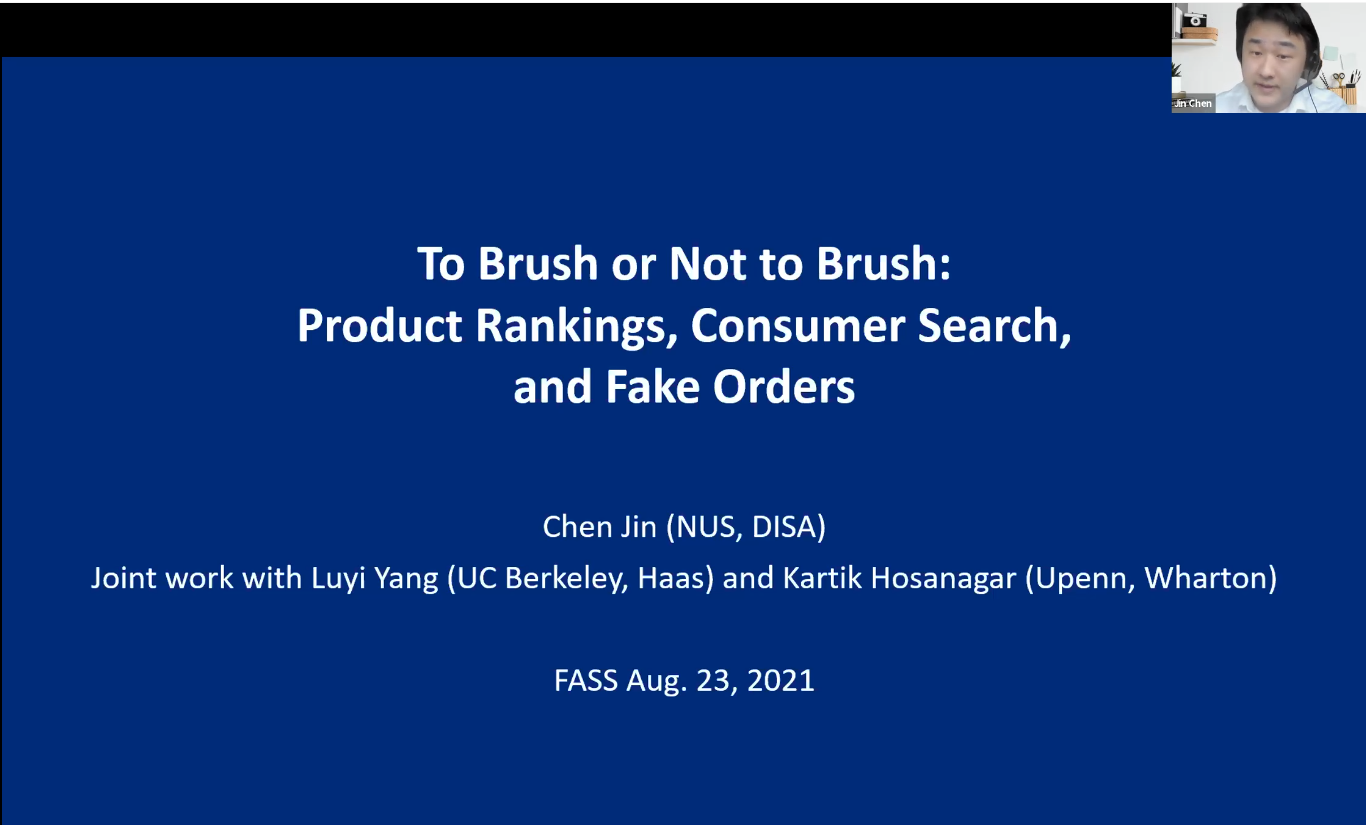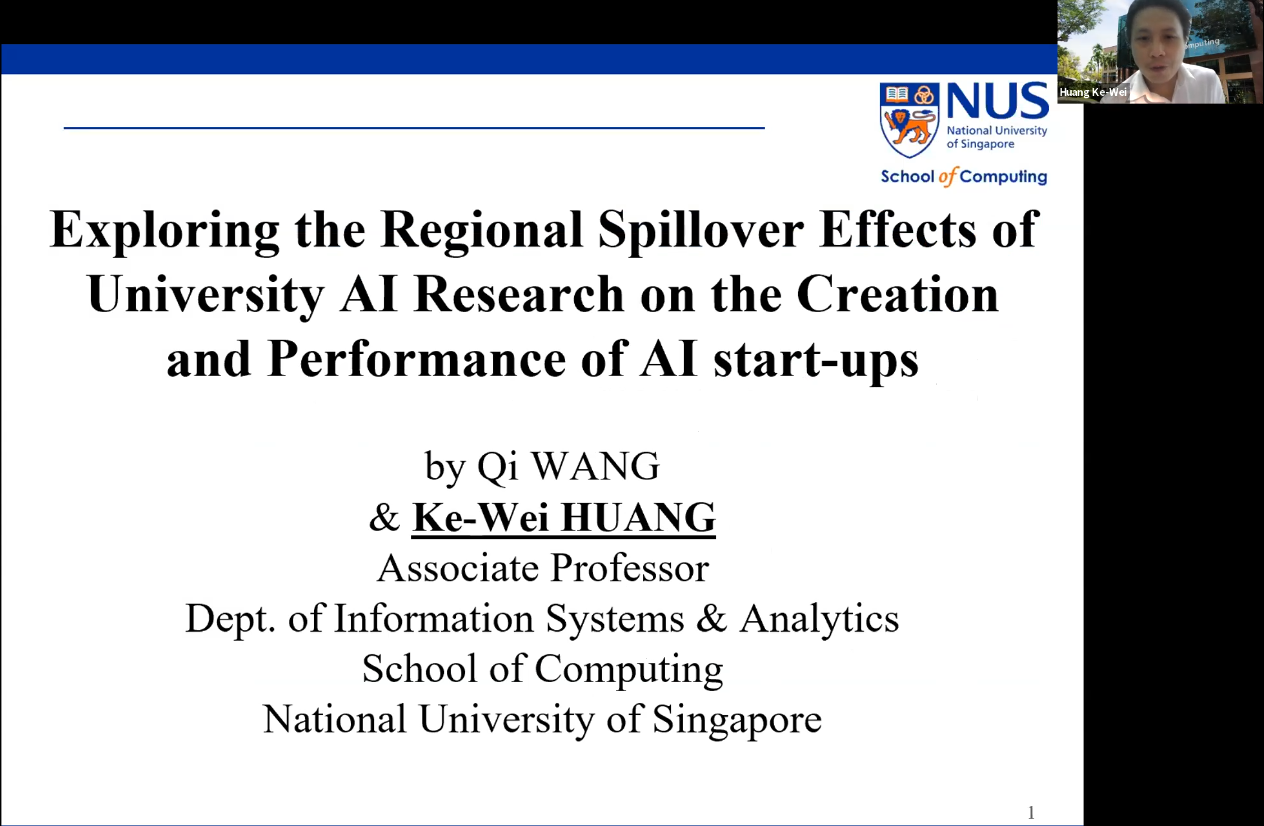FASS Global Research Forum: ‘Education and Trade’ – Presentations from NUS FASS Department of Political Science and NUS School of Computing Department of Information Systems and Analytics
September 20, 2021
The second theme of the FASS Global Research Forum, ‘Education and Trade’, featured presentations by Associate Professor Soo Yeon Kim (NUS Department of Political Science), Assistant Professor Jin Chen (NUS Department of Information Systems and Analytics), and Associate Professor Huang Ke-Wei (NUS Department of Information Systems and Analytics).

Assoc Prof Kim presented on ‘The Language of Institutional Design: Text Similarity in Preferential Trade Agreements’, a project she worked on with her former student Thiyaghessan s/o Poongundranar (University of Chicago). She explained that the project came about from her work coding trade agreements and finding almost identical wording for portions of free trade agreements from 1992 and 1993 from the Slovak republic and Bulgaria, respectively. Assoc Prof Kim found that governments often use templates in preferential trade agreements (PTAs) as they can advance trade liberalization agendas. Templates also cut negotiating costs. However, some PTAs are tailor-made. This prompted Assoc Prof Kim’s research question: Where do these trade agreements differ?
Assoc Prof Kim and her research team examined English-language PTAs, main texts and annexes separately, using quantitative analysis that calculated text similarity based on word frequencies. She discovered that text similarity is higher for main texts than annexes, and that main texts are templates that are centered on general governance areas, whereas annexes are tailored to each nation’s trade partners. Moreover, there has been increasing convergence in the main texts over the years, especially in the World Trade Organization (WTO) without a successful multilateral trade round. At the same time, there has been increasing divergence in annexes, showing continued protection of important sectors of PTAs. Assoc Prof Kim additionally proposed furthering the research in multiple ways, one of which is exploring which countries were more influential in shaping the templates.

Asst Prof Jin presented his project with Luyi Yang (UC Berkeley, Hass) and Kartik Hosanagar (Upenn, Wharton) titled ‘To Brush or Not to Brush: Product Rankings, Consumer Search, and Fake Orders’. He explained that brushing is when online merchants place fake orders of their products to inflate sales volume and move up in search results. Asst Prof Jin elaborated that brushing is widespread across e-commerce platforms and one of them, Alibaba, found that 17% of its sellers had faked 500 million transactions in 2013. Merchants brush primarily because e-commerce platforms’ ranking algorithms favor products with greater sales volume. His research examined both brushing behavior and consumer welfare, specifically the extent to which consumers would benefit if brushing were reduced, if reducing the difficulty of searching for products on platforms would disincentivize brushing and improve consumer welfare, and if changing how much sales are weighted in ranking algorithms would benefit buyers.
Asst Prof Jin and his team built an analytical model that describes the consumer search process, sales ranking evolution, and the ‘brushing game’ between the sellers. The model revealed that when the search cost is low, competing sellers will not have much propensity to brush, but will start to fake orders when the search cost is not low and when the cost of brushing is not high. Partial brushing will occur when its cost and the search cost are intermediate. In addition, increasing the cost of brushing can reduce consumer welfare, so much so that consumers would fare better if the search algorithm ranked online merchants randomly. Moreover, in the short run, reducing the search cost can reduce consumer welfare even if there is no brushing. Reducing the search cost in the long run also can reduce consumer welfare when there is brushing. This shows that improved search technology is not a panacea and that e-commerce platforms need to consider interactions among consumers and the strategic response of sellers to changes in search costs. Finally, in what Asst Prof Jin notes is a double-edged sword, placing more weight on sales volume-related factors both increases sellers incentive to brush and boosts consumer welfare (and placing less weight on it does the opposite). Ultimately, efforts to reduce brushing can backfire and hurt consumers.

Assoc Prof Huang presented ‘Exploring the Regional Spillover Effects of University AI Research on the Creation and Performance of AI Start-ups’, a study with his PhD student Wang Qi. He stated that countries’ artificial intelligence (AI) development strategies typically focus on building an AI ecosystem which involves scientific research of universities, startups, corporate investment, education and talent development, standards and regulations, and digital infrastructure. This July, Singapore announced a $50 million program to advance research on AI and cybersecurity.
Assoc Prof Huang pointed out that governments are investing in university-level AI research assuming that it will produce social or economic benefits and that commercialization of academic research is by large firms or startups. Since governments are focusing on policy tools to cultivate AI entrepreneurship and over 90% of startups fail, he asserts that it is worth exploring whether and which type of university AI research boosts the creation and survival of AI startups. His project examines which types of AI research can better create stronger spillover effects, whether theoretical research contributes to lower knowledge spillovers, whether interdisciplinary research creates stronger spillover effects, and whether citation counts on AI research publications have a significant effect.
Assoc Prof Huang found that knowledge spillovers from theoretical or impactful AI research are more likely to contribute to the creation and positive performance of AI startups. In addition, regional knowledge spillovers from universities have benefited the creation and venture capital financing performance of AI startups. There is also evidence for interdisciplinary research having stronger spillover effects, and machine learning has the strongest effect among AI disciplinary subfields on knowledge spillovers. Moreover, the study revealed that AI entrepreneurs would be advantaged by setting up their businesses near universities with strong AI research bodies. Finally, in terms of policy, governments may need to allocate differential resources in different AI subfields and would benefit from prioritizing high-quality scientific AI research over applied AI research.
Watch the video from Theme 2: ‘Education and Trade’ here.

